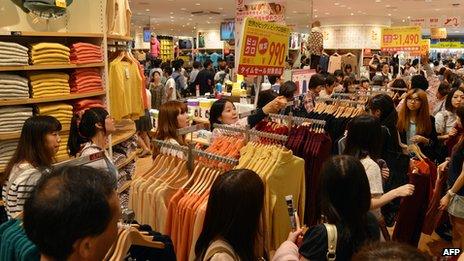Japan retail sales fall after tax increase
- Published

Retail sales in Japan fell 4.4% in April, compared with the same period last year, as the effect of an increase in the country's sales tax began to be felt.
Japan raised the tax from 5% to 8% on 1 April - the first hike in 17 years.
The country faces rising social welfare costs due to an ageing population and is trying to rein in public debt.
Analysts said sales had dropped in part due to consumers rushing to make purchases ahead of the tax rise.
That trend was evident in March, when sales surged 11% - the fastest pace of growth since March 1997.
'Gradual recovery'
The rise in sales tax is also expected to help Japan achieve its 2% target for inflation.
Unlike many other leading economies, Japan has been battling deflation, or falling prices, for the best part of the past two decades.
This has hurt domestic consumption, as consumers and businesses tend to put off purchases in the hope of getting a cheaper deal later on.
Policymakers have said ending that cycle is key to reviving growth in Japan's economy, and have taken various steps to achieve that.
The measures have had some positive impact and consumer prices have been rising in Japan.
The hope is that once prices start to rise, it may force consumers and business to spend more money and not hold back on purchases as they may have to pay more later on.
But there have been some concerns that the tax hike may cause people to hold back on purchases and thus hurt domestic demand.
However, analysts said the drop in sales was likely to be temporary and that domestic consumption was expected to pick up in the coming months.
"There are signs that declines in spending on daily necessities is already bottoming out, which supports a gradual recovery in spending," said Shuji Tonouchi, senior fixed income strategist at Mitsubishi UFJ Morgan Stanley Securities.
Marcel Thieliant, Japan economist at Capital Economics said: "We remain confident that the recovery in household consumption will resume in the second half of the year".
- Published25 April 2014
- Published1 April 2014
- Published15 May 2014